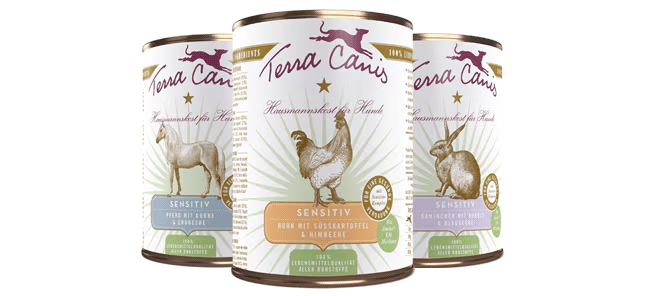THE BASIC FACTS ABOUT A NATURAL AND SPECIES-APPROPRIATE DIET FOR CATS
Today's domestic cat is descended from the African wild cat, which was domesticated millions of years ago. In the wild, these ancestors lived exclusively by hunting and consumed their prey immediately. Even in times of food shortage, they never resorted to plant-based food. Their metabolism still differs significantly from that of dogs, which are descended from the grey wolf. For dogs, dietary flexibility, i.e. the combination of meat and plant food, was essential for survival, whereas cats have always maintained a strict meat-based diet.
The cat – a pure carnivore
Cats are true carnivores, as evidenced by their sharp incisors and long canines, which are perfected for hunting small prey such as birds, fish and rodents. Their unique metabolism relies on animal protein as a primary source of energy and requires large amounts to function optimally. A high meat content is essential for a healthy, species-appropriate diet. The Terra Felis menus consist of 90 % fresh muscle meat, plus valuable offal or pure fish fillets. It is advisable to feed cats fish once or twice a week to round off their diet.
Fibre for a well-functioning digestive system
When eating a mouse whole, a cat consumes important fibre through the mouse’s skin, fur and gastrointestinal contents; this fibre is required for a healthy digestive system and bowel function. In order to replicate this within a cat’s diet, all Terra Felis menus contain a small amount of fibre in the form of selected vegetable varieties and catnip (4–5%). These cleanse the gastrointestinal tract, stimulate gastrointestinal peristalsis and foster balanced gastrointestinal flora. Furthermore, vegetables are rich in vitamins, minerals, trace elements and phytochemicals.
The perfect fatty acid structure
Cats require large quantities of fats/fatty acids. In the wild, cats ingest these important fatty acids (which are not contained in meat) via the stomach contents of their prey, which eat seeds containing oil. Omega-6 fatty acids, linoleic and arachidonic acid and the omega-3 fatty acids eicosapentaenoic acid (EPA) and docosahexaenoic acid (DHA) are essential for cats – and must be ingested in sufficient quantities via their diet. Whereas omega-6 fatty acids are chiefly found in meat, the rapeseed oil found in each and every Terra Felis menu provides cats with valuable omega-3 fatty acids.
Taurine – a vital substance for cats
Mice represent a prey animal with a high taurine content, thus providing cats with a vital amino acid in the wild; after all, taurine is essential for cats. Cats can only produce it themselves in tiny quantities, meaning that it has to be present in their daily diet in order to prevent deficiency symptoms. In addition to its support function for the heart and eyes, taurine is also necessary for the production of bile salts during digestion, which is why cats exhibit continuous and almost profligate taurine consumption. Therefore, all Terra Felis menus contain taurine.
Addition vitamins and minerals
In order to ensure a cat’s required daily intake of micronutrients, each menu is supplemented with a small quantity of vitamins and minerals. Even though Terra Felis menus undergo an exceptionally gentle cooking process, they still lose a certain proportion of their vitamins and minerals. The resulting differences only concern a handful of micronutrients and are very small indeed. More than 90% of essential vitamins, minerals and trace elements are present in a purely natural way in all Terra Felis menus. Any differences have been calculated by means of analysis, with the missing nutrients then supplemented accordingly. As such, supplements are only added to balance out what is actually missing. This prevents a surplus of micronutrients while ensuring a cat’s required daily intake is met in full.


